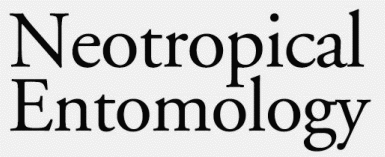Results of field evaluations indicated that the neotropical pentatomid Dichelops melacanthus (Dallas) is associated with wheat, Triticum aestivum L. In the no-tillage cultivation system, adults and nymphs were mostly found on the soil, near the plant stems and underneath crop residues of the preceding summer crop, usually soybean, Glycine max (L.) Merrill, or corn, Zea mays L. Wheat grown under the conventional cultivation system showed minimal bug attack. D. melacanthus caused substantial damage to no-tillage wheat plants, particularly to seedlings. Bug attack reduces the number of seed heads of up to 34%. Seed yield was reduced in 31% due to the bugs' feeding, compared to plants free of damage. All developmental phases of the wheat plant were susceptible to the attack of D. melacanthus, and the greatest yield reduction occurred from stem elongation (26.5%) to milky grain stage (33.1%). Seed treatment using insecticides was efficient, greatly reducing the grain production losses.
Insecta; insecticide; no-tillage; seed treatment; stink bug






